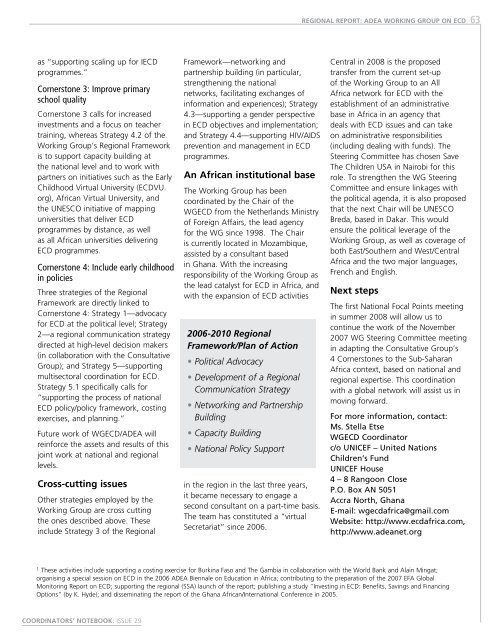A global call to action for early childhood
A global call to action for early childhood
A global call to action for early childhood
You also want an ePaper? Increase the reach of your titles
YUMPU automatically turns print PDFs into web optimized ePapers that Google loves.
REGIONAL REPORT: ADEA Working Group on ECD<br />
63<br />
as “supporting scaling up <strong>for</strong> IECD<br />
programmes.”<br />
Corners<strong>to</strong>ne 3: Improve primary<br />
school quality<br />
Corners<strong>to</strong>ne 3 <strong>call</strong>s <strong>for</strong> increased<br />
investments and a focus on teacher<br />
training, whereas Strategy 4.2 of the<br />
Working Group’s Regional Framework<br />
is <strong>to</strong> support capacity building at<br />
the national level and <strong>to</strong> work with<br />
partners on initiatives such as the Early<br />
Childhood Virtual University (ECDVU.<br />
org), African Virtual University, and<br />
the UNESCO initiative of mapping<br />
universities that deliver ECD<br />
programmes by distance, as well<br />
as all African universities delivering<br />
ECD programmes.<br />
Corners<strong>to</strong>ne 4: Include <strong>early</strong> <strong>childhood</strong><br />
in policies<br />
Three strategies of the Regional<br />
Framework are directly linked <strong>to</strong><br />
Corners<strong>to</strong>ne 4: Strategy 1—advocacy<br />
<strong>for</strong> ECD at the political level; Strategy<br />
2—a regional communication strategy<br />
directed at high-level decision makers<br />
(in collaboration with the Consultative<br />
Group); and Strategy 5—supporting<br />
multisec<strong>to</strong>ral coordination <strong>for</strong> ECD.<br />
Strategy 5.1 specifi<strong>call</strong>y <strong>call</strong>s <strong>for</strong><br />
“supporting the process of national<br />
ECD policy/policy framework, costing<br />
exercises, and planning.”<br />
Future work of WGECD/ADEA will<br />
rein<strong>for</strong>ce the assets and results of this<br />
joint work at national and regional<br />
levels.<br />
Cross-cutting issues<br />
Other strategies employed by the<br />
Working Group are cross cutting<br />
the ones described above. These<br />
include Strategy 3 of the Regional<br />
Framework—networking and<br />
partnership building (in particular,<br />
strengthening the national<br />
networks, facilitating exchanges of<br />
in<strong>for</strong>mation and experiences); Strategy<br />
4.3—supporting a gender perspective<br />
in ECD objectives and implementation;<br />
and Strategy 4.4—supporting HIV/AIDS<br />
prevention and management in ECD<br />
programmes.<br />
An African institutional base<br />
The Working Group has been<br />
coordinated by the Chair of the<br />
WGECD from the Netherlands Ministry<br />
of Foreign Affairs, the lead agency<br />
<strong>for</strong> the WG since 1998. The Chair<br />
is currently located in Mozambique,<br />
assisted by a consultant based<br />
in Ghana. With the increasing<br />
responsibility of the Working Group as<br />
the lead catalyst <strong>for</strong> ECD in Africa, and<br />
with the expansion of ECD activities<br />
2006-2010 Regional<br />
Framework/Plan of Action<br />
• Political Advocacy<br />
• Development of a Regional<br />
Communication Strategy<br />
• Networking and Partnership<br />
Building<br />
• Capacity Building<br />
• National Policy Support<br />
in the region in the last three years,<br />
it became necessary <strong>to</strong> engage a<br />
second consultant on a part-time basis.<br />
The team has constituted a “virtual<br />
Secretariat” since 2006.<br />
Central in 2008 is the proposed<br />
transfer from the current set-up<br />
of the Working Group <strong>to</strong> an All<br />
Africa network <strong>for</strong> ECD with the<br />
establishment of an administrative<br />
base in Africa in an agency that<br />
deals with ECD issues and can take<br />
on administrative responsibilities<br />
(including dealing with funds). The<br />
Steering Committee has chosen Save<br />
The Children USA in Nairobi <strong>for</strong> this<br />
role. To strengthen the WG Steering<br />
Committee and ensure linkages with<br />
the political agenda, it is also proposed<br />
that the next Chair will be UNESCO<br />
Breda, based in Dakar. This would<br />
ensure the political leverage of the<br />
Working Group, as well as coverage of<br />
both East/Southern and West/Central<br />
Africa and the two major languages,<br />
French and English.<br />
Next steps<br />
The first National Focal Points meeting<br />
in summer 2008 will allow us <strong>to</strong><br />
continue the work of the November<br />
2007 WG Steering Committee meeting<br />
in adapting the Consultative Group’s<br />
4 Corners<strong>to</strong>nes <strong>to</strong> the Sub-Saharan<br />
Africa context, based on national and<br />
regional expertise. This coordination<br />
with a <strong>global</strong> network will assist us in<br />
moving <strong>for</strong>ward.<br />
For more in<strong>for</strong>mation, contact:<br />
Ms. Stella Etse<br />
WGECD Coordina<strong>to</strong>r<br />
c/o UNICEF – United Nations<br />
Children’s Fund<br />
UNICEF House<br />
4 – 8 Rangoon Close<br />
P.O. Box AN 5051<br />
Accra North, Ghana<br />
E-mail: wgecdafrica@gmail.com<br />
Website: http://www.ecdafrica.com,<br />
http://www.adeanet.org<br />
1 These activities include supporting a costing exercise <strong>for</strong> Burkina Faso and The Gambia in collaboration with the World Bank and Alain Mingat;<br />
organising a special session on ECD in the 2006 ADEA Biennale on Education in Africa; contributing <strong>to</strong> the preparation of the 2007 EFA Global<br />
Moni<strong>to</strong>ring Report on ECD; supporting the regional (SSA) launch of the report; publishing a study “Investing in ECD: Benefits, Savings and Financing<br />
Options” (by K. Hyde); and disseminating the report of the Ghana African/International Conference in 2005.<br />
COORDINATORS’ NOTEBOOK: ISSUE 29
















